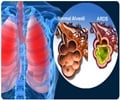A new study has found a link between the level of stress in life and frequency of headaches.

A total of 31 percent of the participants had tension-type headache, 14 percent had migraine, 11 percent had migraine combined with tension-type headache and for 17 percent the headache type was not classified. Those with tension-type headache rated their stress at an average of 52 out of 100. For migraine, it was 62 out of 100 and 59 for those with migraine and tension-type headache.
For each type of headache, an increase in stress was associated with an increase in the number of headaches per month. For those with tension headache, an increase of 10 points on the stress scale was associated with a 6.3-percent increase in the number of headache days per month. For migraine, the number of headache days per month went up by 4.3 percent, and 4 percent for those with migraine and tension headache. The results were adjusted to account for factors that could affect the number of headaches, such as drinking, smoking and frequent use of headache drugs.
"These results show that this is a problem for everyone who suffers from headaches and emphasize the importance of stress management approaches for people with migraine and those who treat them," said study author Sara H. Schramm, MD, of University Hospital of University Duisburg-Essen in Germany. "The results add weight to the concept that stress can be a factor contributing to the onset of headache disorders, that it accelerates the progression to chronic headache, exacerbates headache episodes, and that the headache experience itself can serve as a stressor."
The study was supported by the German Federal Ministry of Education and Research.
Learn more about headache at www.aan.com/patients.
Advertisement
For more information about the American Academy of Neurology, visit www.aan.com or find us on www.facebook.com/pages/American-Academy-of-Neurology-AAN/160632022841, /twitter.com/#!/AANPublic, /plus.google.com/u/0/up/start/?continue and /www.youtube.com/aanchannel.
Advertisement
Source-Newswise















